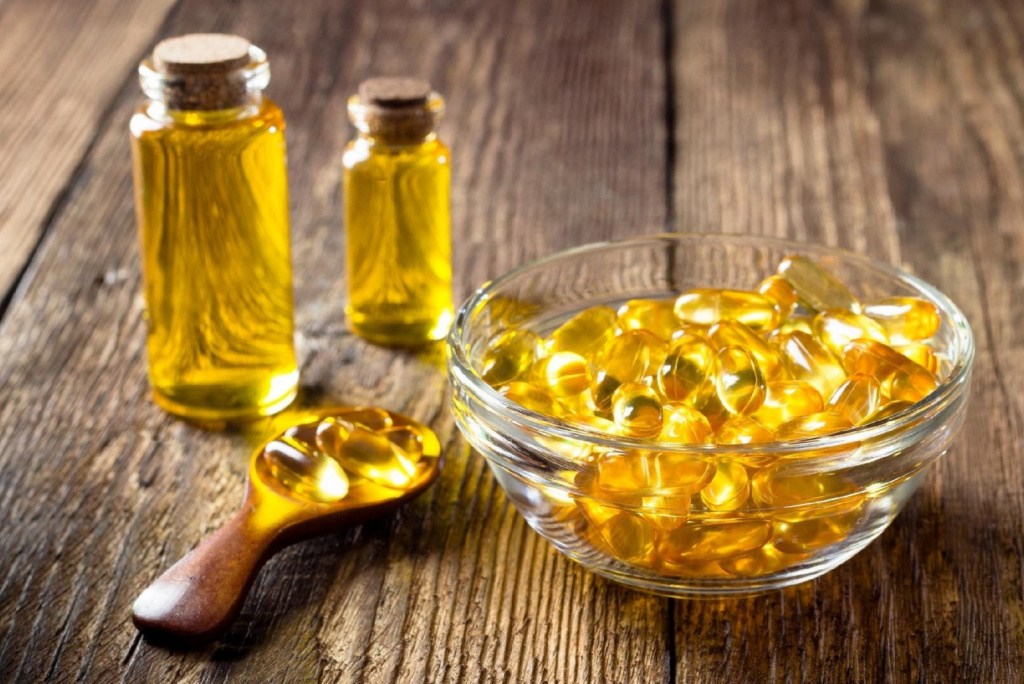
Omega-3 are polyunsaturated fatty acids that are essential for the human body to function properly.
function. In particular, these compounds ensure the normal functioning of the nervous system, heart and blood vessels.
Also
omega-3s help you feel better when you are chronically fatigued and have anti-inflammatory properties.
Table of Contents:
- The main
representatives and their properties - Functions in the body
human beings - Consumption rate
- Signs of shortage
- Foods containing
omega-3 - Omega-3 preparations
Why are fatty acids of this class so necessary for the body? What foods contain them? Is it worth taking special
preparations containing omega-3? Let’s consider the answers to these questions.
The main representatives
and their properties
Omega-3 fatty acids include:
- DHA is docosahexaenoic acid, which is a component of human organs such as the brain, retina, and testicles.
brain, retina, testicles. - EPA (eicosapenoic acid) – stimulates the immune system, takes part in the restoration of cell membranes, helps improve
the absorption of fats in the intestines.
membranes, promotes improved absorption of fats in the intestine. - ALA – alpha-linolenic acid, which helps fight stress, normalize cholesterol and blood pressure, and make hair thick and
shiny and nails strong.
and blood pressure, as well as making hair thick and shiny and nails strong.
It should be noted that omega-3s are not synthesized in the human body. These compounds must be present in the foods
in the foods that make up the diet of each of us. Such fatty acids as DHA and EPA are enriched with seafood: fish,
shrimp, mussels, squid. ALA, on the other hand, is found mainly in plant foods.
Functions in the human body
Omega-3’s literally help you maintain and increase your health because they:
- Participate in the synthesis of eicosanoids (tissue hormones), which regulate intracellular metabolism.
- Reduce the risk of heart attack and stroke by lowering blood cholesterol levels.
- Are an important component of the tissues of the organs of the nervous system.
- Take part in the formation of sperm cells.
- Regulate the production of many hormones, which includes testosterone.
- Help cope with psycho-emotional overload, prevent the development of depressive states.
- Prevent allergies and the development of autoimmune processes due to their anti-inflammatory properties.
- Improve memory and attention.
- Improve memory and attention.Beneficial effect on skin condition.
- Reduce levels of the stress hormone cortisol.
In addition to all of the above, omega-3’s are essential for anyone who wants to lose weight and is actively engaged in
sports: they help to
fat burning and help build lean muscle mass. Fatty acids of this class are also useful for patients with chronic
arthritis and osteoarthritis, as they improve joint elasticity.
Consumption rate
On average, a person needs to consume 1-2 grams of omega-3 per day, but in many cases the need for these
in many cases. For example: pregnant women, menopausal women and athletes should receive at least 2.5 grams of
polyunsaturated fatty acids.
grams of polyunsaturated fatty acids.
The need for omega-3 is also increased in people who:
- Suffering from depression.
- Have atherosclerosis, cancer, autoimmune diseases.
- They live in regions with harsh climates.
Children and pensioners also have a special need for these healthy fats. When forming the diet of representatives of all
these categories, preference should be given to products of animal origin enriched with omega-3.
When forming the diet of all of these categories, preference should be given to products of animal origin enriched with
omega-3.
Signs of shortage
Symptoms of omega-3 deficiency include:
- Dry skin and hair, brittle nails.
- Persistent thirst.
- Lack of energy, lethargy and sleepiness, depression.
- Deterioration of memory and attention.
- Decreased immunity, which is manifested primarily by frequent acute respiratory viral infections and colds.
In infants and preschool children, a deficiency of omega-3 fatty acids is manifested by mental retardation.
Despite the fact that omega-3 are very useful, if they are taken uncontrollably, an overabundance of these substances
may occur.
This condition is manifested by constant diarrhea, low blood pressure, decreased blood clotting.
Foods containing omega-3
As mentioned above, polyunsaturated fatty acids are rich in seafood and fish. The most generous sources
of animal omega-3s are:
- Sardine.
- Salmon.
- Cod liver.
- Caviar (mainly black and red caviar).
- Mackerel.
- Tuna.
- Shrimp, oysters.
Some plant-based foods also contain omega-3:
- Flaxseed oil and rapeseed oil.
- Chia seeds.
- Walnuts.
- Spinach.
- Radish.
- Almonds.
It is important to remember that polyunsaturated fatty acids are destroyed by heat treatment. So it’s important to
include
low-salted fish, fresh vegetables, non-fried nuts, vegetable oils.
Omega-3 preparations
Pharmacological supplements containing beneficial fatty acids are successfully used as part of the complex therapy of
of many conditions: chronic joint diseases, atherosclerosis, body weight deficiency, depression, skin diseases, etc.
The standard therapeutic dose is considered 2.5-3 grams of lipids per day. The drug is taken immediately after a meal,
drink
capsule with water.
Biocomplexes with an optimal amount and ratio of fatty acids (DHA and EPA) include:
- Omega-3, Triple Strength (Solgar).
- Omega-800 (Madre Labs).
- Ultra omega-3 (Now Foods).
- Omega-3 (Natural Factors).
For children, preparations with omega-3 are available in the form of syrups, candies, pastilles. Growing organism
polyunsaturated fatty acids
polyunsaturated fatty acids are essential for the proper development of the nervous and immune systems, the formation of
cognitive skills
(perception, thinking, memory).
So, undoubtedly, omega-3 fatty acids have many beneficial properties. Include in the diet foods rich in these substances
in the diet, it’s important for all of us. However, special dietary supplements have both indications and some
contraindications to taking them, so they should be used after consulting a doctor.
